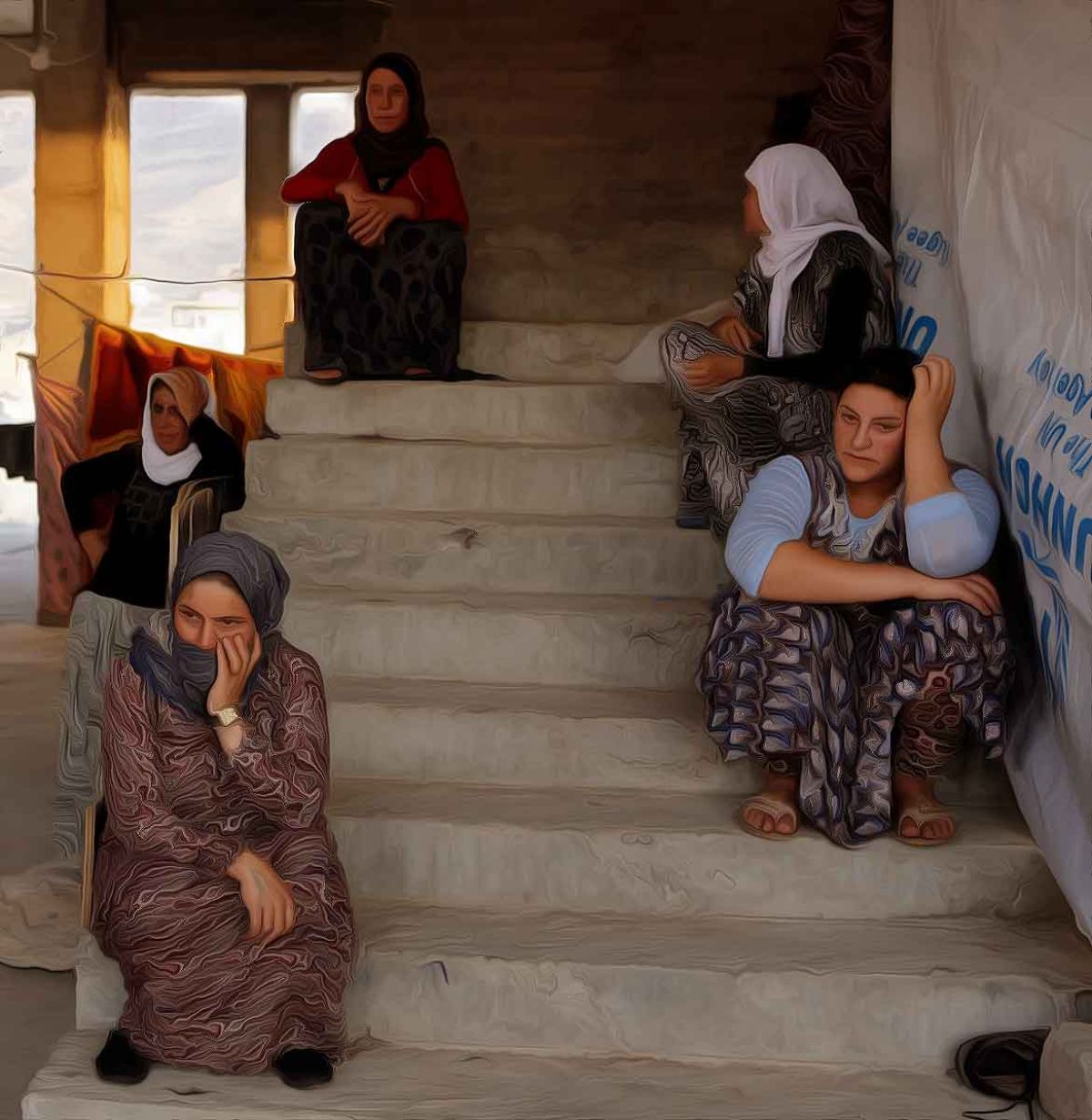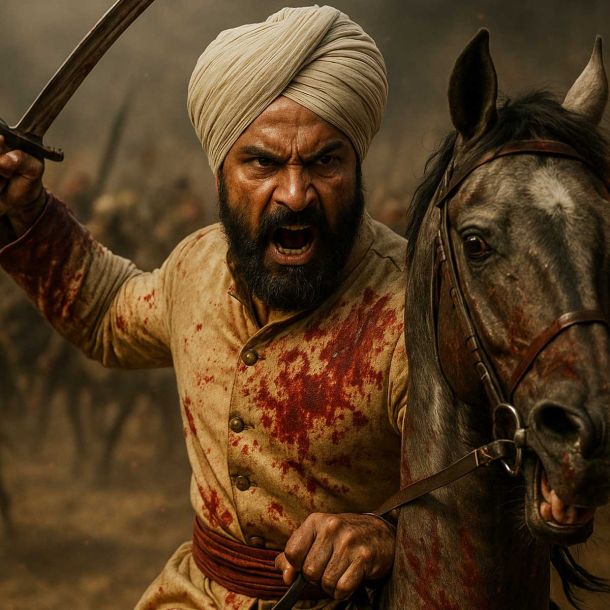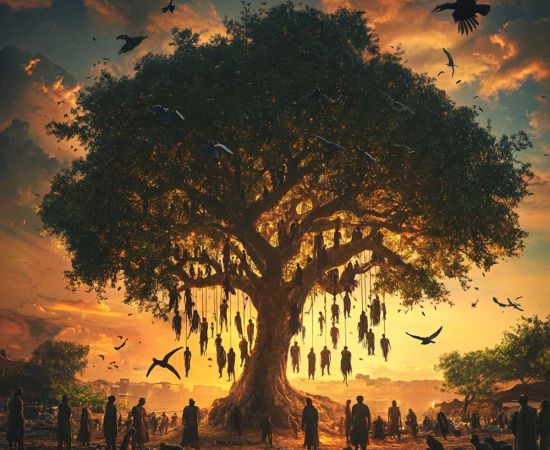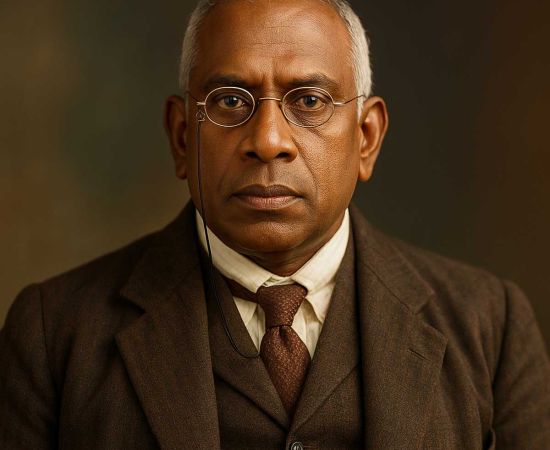MORE COVERAGE
Twitter Coverage
Satyaagrah
Written on
Satyaagrah
Written on
Satyaagrah
Written on
Satyaagrah
Written on
Satyaagrah
Written on
JOIN SATYAAGRAH SOCIAL MEDIA
"Whenever I hear anyone arguing for slavery, I feel a strong impulse to see it tried on him personally": Switzerland - Albanian Muslim migrant Father and sons kept four women as slaves for 16 years, abused them, and isolated them from the outside world

They’re Kosovar Albanians. Kosovo is 96% Muslim. Anu Sivaganesan downplays the role of kanun, Albanian customary law. He says “there are other aspects to consider,” without explaining. Might they be these?
|
Slavery is acceptable in Islam. The Qur’an has Allah telling Muhammad that he has given him girls as sex slaves: “O prophet, indeed, we have made lawful to you your wives to whom you have paid their dowries, and those whom your right hand possesses of those whom Allah has given you as spoils of war.” (Qur’an 33:50)
Muhammad bought slaves: “Jabir (Allah be pleased with him) reported: There came a slave and pledged allegiance to Allah’s Apostle (may peace be upon him) on migration; he (the Holy Prophet) did not know that he was a slave. Then there came his master and demanded him back, whereupon Allah’s Apostle (may peace be upon him) said: Sell him to me. And he bought him for two black slaves, and he did not afterward take allegiance from anyone until he had asked him whether he was a slave (or a free man).” (Muslim 3901)
|
Muhammad took female Infidel captives as slaves: “Narrated Anas: The Prophet offered the Fajr Prayer near Khaibar when it was still dark and then said, ‘Allahu-Akbar! Khaibar is destroyed, for whenever we approach a (hostile) nation (to fight), then evil will be the morning for those who have been warned.’ Then the inhabitants of Khaibar came out running on the roads. The Prophet had their warriors killed, their offspring and woman taken as captives. Safiya was amongst the captives. She first came in the share of Dahya Alkali but later on she belonged to the Prophet. The Prophet made her manumission as her ‘Mahr.’” (Bukhari 5.59.512) Mahr is bride price: Muhammad freed her and married her. But he didn’t do this to all his slaves:
Muhammad owned slaves: “Narrated Anas bin Malik: Allah’s Apostle was on a journey and he had a black slave called Anjasha, and he was driving the camels (very fast, and there were women riding on those camels). Allah’s Apostle said, ‘Waihaka (May Allah be merciful to you), O Anjasha! Drive slowly (the camels) with the glass vessels (women)!’” (Bukhari 8.73.182) There is no mention of Muhammad’s freeing Anjasha.
|
“Father and sons kept women as slaves,” translated from “Vater und Söhne hielten Frauen wie Sklavinnen,” SRF, November 7, 2022 (thanks to Dal Baati Churma Rajasthani Surma):
The indictment is the record of years of martyrdom. For 16 years, an Albanian man and his sons are said to have kept four women like slaves, abused them, and isolated them from the outside world. Now the 65-year-old man and his four sons have to answer to the regional court in Moutier in the Bernese Jura. They are accused, among other things, of human trafficking, forced marriage, rape, and sexual acts with children.
Anu Sivaganesan from the Forced Marriage Unit on the current case – and on the general situation with the integration of the Albanian-speaking diaspora in Switzerland.
SRF News: What are your thoughts on the case being heard in the Moutier court?
Anu Sivaganesan: It is an extreme case, a tragic and blatant case. At the same time, I am interested in how the negotiation will go. The rule of law should decide which allegations are correct and on which charges the perpetrators are found guilty.
The lawyer for the women concerned assumes that the family clan refers to the kanun, Albanian customary law: what exactly does that mean when a clan lives according to the kanun?
Customary law has practically no status in Kosovo itself. It is very different for Albanian speakers in Switzerland. It may be that individual traditional families still live after it. However, the kanun does not play a major role in people who immigrated from Kosovo or their descendants. The second generation doesn’t really care about the kanun. But there are other aspects to consider.
|
How do you experience the integration of Kosovar Albanian families, especially the women?
I experience this as very good as far as women are concerned. Many people who grew up in Switzerland contact us at our advice center about forced marriage and general pressure and coercion in relationships. So they get help – it’s a sign of integration. A revolution is taking place. More and more Albanian-speaking men dare to break out of family ties and seek help.
Integration must include women learning right from the start what their rights are and where to find advice.
Why is it so difficult to recognize such cases?
Domestic violence is a phenomenon that is generally very difficult to track down. Affected people from families with a migration background may not be aware of any counseling services. Or they don’t have access to it. In the current case, the women were undocumented. In Switzerland, we have a good victim support system with various counseling services, be it in the area of domestic violence or forced marriages.
|
“Forced marriages are no longer a fringe phenomenon”
Anu Sivaganesan heads a national agency against forced marriages. There, Albanian-speaking people, mostly from Kosovo or North Macedonia, were the second largest group affected by forced marriage last year. In the first place are Afghan people in Switzerland.
Kurdish-speaking people are also affected, for example from Turkey or people from Sri Lanka. “In general, forced marriage is no longer a hidden reality,” says Sivaganesan. “Recently we had between 300-350 cases per year – including forced engagements and marriages of people under the age of 18. Unfortunately, these are no longer a marginal phenomenon in Switzerland.”
Perhaps the abused women were not aware of their rights. Because they’ve been cut off from the outside world for so long, they may have thought it was just their destiny. Education and awareness are therefore needed. Integration must include women learning right from the start what their rights are and where to find advice.
References:
 Support Us
Support Us
Satyagraha was born from the heart of our land, with an undying aim to unveil the true essence of Bharat. It seeks to illuminate the hidden tales of our valiant freedom fighters and the rich chronicles that haven't yet sung their complete melody in the mainstream.
While platforms like NDTV and 'The Wire' effortlessly garner funds under the banner of safeguarding democracy, we at Satyagraha walk a different path. Our strength and resonance come from you. In this journey to weave a stronger Bharat, every little contribution amplifies our voice. Let's come together, contribute as you can, and champion the true spirit of our nation.
 |  |  |
| ICICI Bank of Satyaagrah | Razorpay Bank of Satyaagrah | PayPal Bank of Satyaagrah - For International Payments |
If all above doesn't work, then try the LINK below:
Please share the article on other platforms
DISCLAIMER: The author is solely responsible for the views expressed in this article. The author carries the responsibility for citing and/or licensing of images utilized within the text. The website also frequently uses non-commercial images for representational purposes only in line with the article. We are not responsible for the authenticity of such images. If some images have a copyright issue, we request the person/entity to contact us at satyaagrahindia@gmail.com and we will take the necessary actions to resolve the issue.
Related Articles
- ‘Sangli mass murder by Tantrik“: Occultist Abbas Mohammad Ali poisoned entire family of 9 to look like a suicide pact, ‘secular’ media gives a Hindu spin by calling him ‘Tantrik’, Abbas unable to return huge sum borrowed from family took this step
- "The bad man desires arbitrary power. What moves the evil man is the love of injustice": Minor girl Chanda’s parents not allowed to meet her at ‘shelter home’, but her Baloch abductor is! ‘Liberal’ newspaper of Pakistan Dawn newspaper downplays abduction
- National security or victims of Muslim rape gangs are not a priority for UK to avoid “Islamophobia” label as in most Western countries: Convicted pedophile Muslim MP served on government Muslim rape gang panel
- 'Armed jihad...': France shuts Allonnes mosque and Islamic school for harbouring 'radical Islam', plans to close 7 more
- NDMC to bulldoze “illegal encroachments” in Delhi's Jahangirpuri where riots broke out against Hindu devotees: Tukde tukde gang supporter AAP’s Amanatulah Khan says ‘attempt to disrupt peace during Ramzan’
- Ataullah Malik sentenced to 25 years of rigorous imprisonment by POCSO Special Court in Jharkhand for abuse and rape of a 5-year-old girl: Police registered case after the intervention of the court
- 13 arrested following an Islamist attack on a Hindu procession in Mira Road, Deputy CM Fadnavis enforced a 'zero tolerance' policy, amidst Ayodhya's Ram Mandir Pranpratishtha, this clash in a Muslim-majority area prompted a police flag march, urging peace
- ‘They are taught to kill Hindus. Ban the holy book that teaches beheading, where is the award wapsi gang now?’: Ask outraging Hindus during protests against Kanhaiya Lal beheading for supporting Nupur Sharma at Jantar Mantar in Delhi
- During the Durga Visarjan in Bahraich, UP, Muslims objected to DJ music, leading to stone-pelting from their side, Ramgopal Mishra, recently married, was shot 24 times; eyewitnesses allege attackers used the police lathi-charge to kill him, blaming police
- "Reason enslaves all whose minds are not strong enough to master her": Egyptian female professor Suad Saleh from Al-Azhar University in Cairo claimed that Muslim men are allowed by Allah to rape non-Muslim women in order to “humiliate” them
- Uttar Pradesh Police in action: Prayagraj Violence mastermind Javed Ahmed's house bulldozed by authorities, Javed had executed stone-pelting at police by pushing children in front during violence against Nupur Sharma's remarks on Prophet
- "Papa, you were right": Assam reels under shock as Anju Dorjee, 26, a Hindu girl found dead in a suspected case of Love Jihad involving Mani Khan, a married father of two, the tragic incident raises pressing questions about the safety of Hindu women
- Ex-radicalised Muslim author studies mosques in UK, reveals Taliban, ISIS-like lifestyle of the ultra-orthodox community
- The untold exodus of 1.5 lakh Punjabi Hindus to Delhi’s Piragarhi camp; forced upon by Sikh radical Khalistani terrorists led by Bhindranwale
- Muslims pretended to offer Friday Namaz, gathered mob at Gyanvapi Mosque in Varanasi and raised religious slogans as the survey and videography of disputed structure started



























